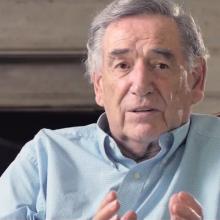death
The military statement differed from reports by witnesses and local officials that said many more bodies were pulled from the building after a coalition strike targeted IS militants and equipment in the Jadida district.
“In a town where powerful people are constantly trying to increase their name recognition and their brand, Doug Coe was the opposite of that,” said Michael Cromartie, director of the Evangelicals in Civic Life program at Washington’s Ethics and Public Policy Center. “He was a man who liked to work behind the scenes, who did not call attention to himself, who was a sort of a pastor to people in power.”
Congregants who’ve heard the sermons — often accompanied by workshops and step-by-step guides — say they are verbal permission slips to discuss a topic few want to talk about. Slightly more than a third of the general public — 37 percent — say they have given a great deal of, or some thought, to their end-of-life wishes, according to Pew Research.
A Conversation Project survey found that while 90 percent of people say it’s important to talk to loved ones about those wishes, only 27 percent have actually done that.
On April 30, 2016, Catholic peacemaker and activist Daniel Berrigan entered life eternal. He was a teacher and friend to many in the Sojourners community. Read more reflections on Dan's life and legacy in the August 2016 issue.
I ONCE HAD a conversation with Dan about his death. We were talking late into the night at the Block Island hermitage that his friends William Stringfellow and Anthony Towne had built for him while he was two years in Danbury federal prison, a consequence of the 1968 Catonsville draft board action. He had by then foresworn scotch, on doctor’s orders, so I was being introduced to Manhattans dry, which were somehow allowed. The place suited the topic. On the wall above us was an exorcism poem that he’d hand-lettered in a style familiar to Catholic Worker and resistance houses across the country.
I’m certain it was I who broached the topic. When we met in the early ’70s, it was in the wake of notorious assassinations: Medgar Evers and Viola Liuzzo, the Panthers, Malcolm, King, the Kennedys. There was a certain youthful grandiosity in imagining that he or others who were such troublesome peacemakers would be similarly targeted. I braced my heart. I told him so. (Then he turns around and lives, thanks be, to 94!)
On April 30, 2016, Catholic peacemaker and activist Daniel Berrigan entered life eternal. He was a teacher and friend to many in the Sojourners community. The following article is adapted from the homily Steve Kelly gave at Dan's May 6 funeral Mass in New York City. Read more reflections on Dan's life and legacy in the August 2016 issue.
IN THE STORY OF LAZARUS, told in John’s gospel, seemingly Jesus arrives too late. Humanity, doomed like Lazarus, is sealed under two tons of stone. Is this then an inspired picture of how God sees us? Humanity sealed up in death? Death taunting Jesus until Jesus has a visceral reaction? The hand of death moves the chess piece toward checkmate.
The complexity of the lie goes: “Once you are dead, once afraid, how will God guide you?” If afraid, how can one obey the guidance, dependence on the one who sent him?
“Greater love has no one than to lay down one’s life for a friend.” So God does know what it’s like to encounter death’s whiplash version. Always, everywhere, each time, each encounter, risks are included.
Jesus went the distance in this anguishing scene. To see him at work is to see life itself overcoming death, because he, as a human being, cooperated, obeyed the guidance of the one who sent him. He loved, he lays down his life.
Now there is a different moral power in town. God is going to crack death’s veneer, a chink in the armor. Through Jesus’ obedience, the crumbling begins, and the hidden, insipid hold of death is broken.
WHEN WE LOSE a Christian peacemaker such as Daniel Berrigan, as we did in April, it gets very personal for many of us. Berrigan shaped and motivated a Catholic peace movement that became a fundamental and foundational influence on Sojourners and on me personally.
During my early years at Michigan State University, friends were drafted, others feared they would be next, and the Vietnam War consumed the attention of an entire generation. Then I learned about Daniel and Philip Berrigan and the small group of Christian protesters they were inciting. They were the only Christians I had heard about who were against the war in Vietnam.
Here were some Christians who were saying and doing what I thought the gospel said—and what nobody in my white evangelical world was saying or doing. The witness of the Berrigans helped keep my hope for faith from dying altogether. African-American Christians fighting for justice and that “Berrigan handful” of Christians fighting for peace paved the way for my return to faith.
Daniel and Philip Berrigan rose to national prominence after they and seven others burned 378 draft files with homemade napalm taken from a draft-board office in Catonsville, Md., on May 17, 1968. The result was jail sentences for the group and, eventually, Daniel’s play “The Trial of the Catonsville Nine.”
Ta-Nehisi Coates on the Obama administration’s decision to seek the death penalty for the Charleston shooter: “The hammer of criminal justice is the preferred tool of a society that has run out of ideas.”
2. At Baylor, the Real Story Isn’t Hypocrisy. It’s the Victims of Sexual Assault.
“... this is a story much larger than Ken Starr and Baylor. This story is about power, and money, and institutions that claim to be faith-based but refuse to stand for victims and against violence.”
Lives in the hands of algorithms—
I’m a hospice volunteer. I visit several patients each week, just sit down and chat about stuff. I do it primarily for me – it’s who I am, how I’m wired, and I suspect that I get a lot more out of it than the people whom I visit. They share some of the most poignant and difficult and joyful moments with me. And their final days.

Image via Stephen Masker/Wikimedia Commons
Antonin Scalia, leading figure of the conservative wing of the Supreme Court, has died at age 79. He died, apparently of natural causes, while on vacation in Texas.

Image via Lisa Missenda/Shutterstock.com
“You are dust, and to dust you shall return.” Every year on Ash Wednesday, I seek out some member of the clergy to say those words to me. They come from the curse of mankind in Genesis 3, but I find blessing in hearing them in the tale of the loving purposes of God.

David Bowie (left) JStone / Shutterstock.com; Alan Rickman JStone / Shutterstock.com
All of my favorite theologians are dying. David Bowie. Alan Rickman. A couple of years ago it was Pete Seeger. It is as if all my favorite theologians are moving on.
Please take me seriously as I say this. It has been a grief-striking week. Just like when Robin Williams passed, there is this void in my life, in my way of knowing God.

Image via REUTERS/Stefan Wermuth/RNS
The legendary musician and showman David Bowie was as mutable and enigmatic about his religious views as he was about his music, art and gender-bending fashion choices.
Yet his death from cancer Jan. 10 at 69 brought tributes from religious leaders who knew talent when they saw it, and perhaps recognized that Bowie’s crossover style would inevitably touch the ineffable as he constantly looked for meaning — and novelty.
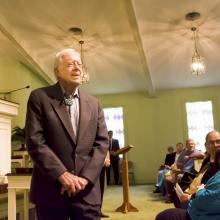
Image via Frank Kavanaugh / RNS
Former president Jimmy Carter was late to his Bible study class Sunday morning, something he said never happens as he walked up to the front of the sanctuary. There he received hugs from those who likely already knew why.
His service started with an announcement of something Carter’s voice indicated was weighing heavily on his heart.
His grandson, Jeremy Carter, who had spent Thanksgiving with him just weeks ago, died suddenly in the night.
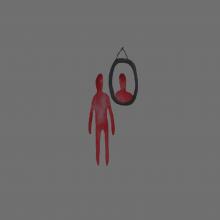
Image via KA-KA/Shutterstock.com
“Christ agrees to die so that mankind will live,” wrote Girard in his book Things Hidden Since the Foundation of the World.
Many progressive Christians who do not know Girard’s work will bristle at that statement. Indeed, without reading his books, it could sound like a form of penal substitutionary atonement theory that claims Jesus allows humanity to live by saving us from the violent wrath of God.
But nothing could be further from the truth. The truth that Girard revealed throughout his career is that wrath doesn’t belong to God. It belongs solely to humans. In anthropological terms, what was revealed by the death of Jesus was the human scapegoat mechanism. Once you read Girard’s works, you realize how obvious it is that the violence at the cross had nothing to do with God, but everything to do with the human propensity to scapegoat.
If Girard taught us anything, it’s that humans have been projecting our own violence onto God since the foundation of the world. We justify our violence and hatred against our scapegoats in the name of God or peace or justice, or whatever we deem to be important to our well-being.
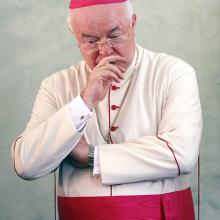
Jozef Wesolowski, in 2011. Photo via Orlando Barria / Catholic News Service / RNS
The Polish ex-nuncio — as Vatican ambassadors are called — had been due to stand trial on charges he paid for sex with children during his time in the Dominican Republic. Criminal proceedings were expected to get underway on July 11 but were halted after Wesolowski was hospitalized.
A lawyer for the former bishop said at the time he was unaware of Wesolowski’s suffering from health problems.
“I saw him two or three days ago, and, given his age and his state of mind, he was fine,” said Antonello Blasi, according to The Associated Press. The lawyer told the court that Wesolowski had been “willing and able” to come to court.

Photo via Brad Sauter / Shutterstock.com
The officer indicted for the murder of Samuel DuBose just blocks from the University of Cincinnati campus pleaded not guilty, NBC News reports. Outrage over the shooting death of DuBose, father of 10, during a traffic stop on July 19 has been widespread since video footage surfaced Wednesday, with calls for a murder conviction for officer Ray Tensing.
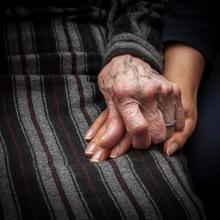
Holding hands in a nursing home, Eduard Darchinyan / Shutterstock.com
The nursing home was quiet, which is typical for a late Sunday afternoon. I walked to the end of the hall where Grace lives in a room decorated with clown figurines that make her smile. I knocked at the doorway and announced myself. Grace was awake in bed, but upset about something.
“Oh, Joe! Come in! Can you do me a favor? I’ve lost something and could use your help finding it.”
Grace (not her actual name; I have to change it because of privacy laws) once had bright red hair that fit her personality. The red is gone now; her hair turned a pretty, cottony white after chemotherapy.
And today, something else was missing.
“I can’t find my left boob,” she said. “Would you be a dear and look around for it?”
BIBLICAL LAMENT includes both pleas to God for help and mournful dirges. Sometimes they are rooted in individual travails and grief, other times in anguish for those crushed by injustice or war.
The psalmist and the prophets dig deep into visceral images of bodily suffering—and stretch up, out, yearning to find symbols and metaphors in nature that might capture the mercy and presence of a God who, the psalmist isn’t afraid to say, is sometimes a bit elusive.
“So, tell me about eternity …”
“Eternity?!?” I thought to myself. “I’m just beginning to learn about the present! Eternity is mystery.”
As a pastor, I’ve been trained to not answer those kinds of questions. It’s best to invite others to explore and answer their own questions, as opposed to giving our answers. But for some reason that felt inauthentic in the moment. Sometimes providing answers is the most compassionate thing we can do. But, in the face of eternity, who has answers?
Sufjan Stevens’ newest album, Carrie & Lowell (out now), is a heartbreaking meditation on personal grief. It’s also joyful, baffling, and delicately mundane.
In the spirit of a listening party, a few of us sat down to play through the album, sharing liner notes and meditations on the songs that grabbed each of us. Conclusion: it's really, really good. Stream Carrie & Lowell here, and listen along with us below.
“Death With Dignity” — Tripp Hudgins, ethnomusicologist, Sojourners contributor, blogger at Anglobaptist
Tripp: I love the first song of an album. I think of it as the introduction to a possible new friend. “Where The Streets Have No Name” on U2’s Joshua Tree or “Signs of Life” on Pink Floyd’s Momentary Lapse of Reason, that first track can be the thesis statement to a sonic essay.
So, when I get a new album — even in this day of digital albums or collections of singles — a first track can make or break an album for me. I sat down and listened attentively to “Death With Dignity.” It does not disappoint. With it Stevens introduces the subject of the album — his grief around troubled relationship with his mother and her death — as well as the sonic palate he will use throughout the album.
Simple guitar work, layered voicing, and a little synth, the album is musically sparse. The tempo reminds me of movies from the nineteen sixties or seventies where the action takes place over a long road trip.
Catherine Woodiwiss: I was thinking road trip, too. There’s real motion musically, which, given a claustrophobic theme and circular lyrics, is a thankful point of release. It’s a generous act, or maybe an avoidant one — he could have made us sit tight and watch, and he doesn’t quite do it.
Julie Polter: This isn’t a road movie, but the reference to that era of films just made me think of Cat Stevens’ soundtrack for Harold and Maude, especially “Trouble.” (This album is one-by-one bringing back to me other gentle songs of death and duress and all the songs I listen to when I want to cry).

